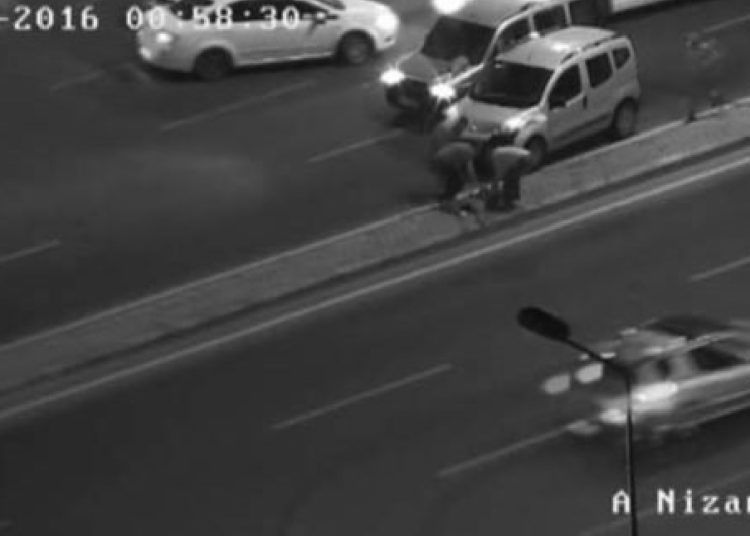Turkish investigators neither conducted autopsies on victims nor tested suspects for gun shot residue in the murder of 10 civilians during events that transpired during a 2016 coup attempt in front of the Gendarmerie Forces Command headquarters, a recent court hearing in the case revealed.
The scandalous revelation came when the Turkish court started conducting hearings into events that occurred in and around the building of the Gendarmerie Forces Command in the Bestepe neighbourhood. According to court transcripts obtained by the Nordic Monitor, Lt. Col. Muharrem Demirkale, an intelligence officer who was assigned as an instructor at the Bestepe Gendarmerie Schools Command, testified during a hearing held on March 13, 2018 that the government did not order any autopsies for the people who lost their lives during the conflict.
While the autopsy of a body is standard procedure in criminal investigations, he asked why the government had failed to conduct these procedures to determine how the victims died. “There is nothing about which gun and which bullet were used in the shooting [of these victims]. Isn’t that shocking?” he said. Demirkale also noted that there were no shell casings in the evidence file despite the fact that there was a heavy exchange of gunfire between the alleged putschists and the people who responded to the scene, which was also strange.
What’s more, the investigators failed to test the suspects for gun shot residue, Demirkale underlined, stating that in criminal investigations the gendarmerie always takes hand swipes even in cases where suspects use Molotov cocktails. He also shared what he witnessed at the scene on the night of the coup when police special units responded to incidents at the command center. He said at one point police used an armoured patrol car called a Shorland (with a machine gun mounted on the roof) from inside the base. “Perhaps the police realized that there were CCTV cameras recording events and took the machine gun off the base,”’ he said, adding, “We still don’t know what they did with the gun.”
He referred to testimony in the case file provided by a man who joined the civilians protesting the coup attempt in front of the Gendarmerie Forces Command building and who said his brother was not shot from the base but rather was killed by a civilian in the crowd. Demirkale claimed that unidentified gunmen who looked like Islamic State in Iraq and Levant (ISIL) militants blended into the crowd not only in Bestepe but also in other places such as the General Staff headquarters. The government of President Recep Tayyip Erdoğan has not investigated these claims despite video footage and witness and suspect statements.
Demirkale explained that many officers were recalled to their bases over a threat of ISIL terrorist attacks and thought they were to neutralize the threats and protect military bases. In 2015 alone, 142 people were killed in Turkey in three separate ISIL attacks, with an attack that took place on Oct. 10, 2015 that killed 103 people the deadliest in the history of modern Turkey.
Demirkale noted that officers at the base refrained from firing or using the heavy artillery in their arsenal, which limited the number of casualties. “Whoever plotted this planned to kill tens of thousands at that night,” he said, adding that casualties were limited through the common-sense approach of military officers. He also testified that he and many officers who were detained were subjected to heavy torture when in fact it would have been easy to determine who had been involved in the attempt if the government had used hand swipes and other crime scene investigation techniques.
Turkey survived a military coup attempt on July 15, 2016 that killed 249 people. Investigators at the Stockholm Center for Freedom (SCF) said in a report in 2017 that the coup attempt was a false flag orchestrated by Erdoğan and his intelligence and military chiefs to create a pretext for the mass persecution of critics and opponents and to push the Turkish military into an incursion into Syria.
The fact that Hakan Fidan, the head of the Turkish intelligence service (MİT), was tipped off about the coup in advance according to his own written statement sent to Parliament but that he informed neither the prime minister nor the president strengthened the claim that the coup bid was totally staged. In an unusual move, Fidan met with the top military officers for hours a day before the coup as well as on the day it took place and did not show any alarm despite a reported tip-off that he was going to be whisked away and detained by the military.
Erdoğan pinned the blame on the Gülen movement even as the events were still unfolding. Fethullah Gülen, who inspired the movement, strongly denied having any role in the failed coup and called for an international investigation into it, but President Erdoğan — calling the coup attempt “a gift from God” — and the government initiated a widespread purge aimed at cleansing sympathizers of the movement from within state institutions, dehumanizing its popular figures and putting them in custody.
Turkey has suspended or dismissed about 170,000 judges, teachers, police and civil servants since 2016 and jailed close to 80,000 including hundreds of journalists over alleged links to the Gülen movement.












